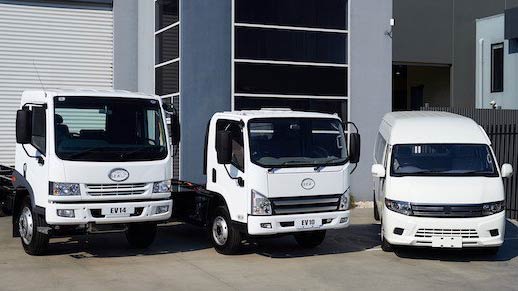Victoria based electric vehicle technology company, SEA Electric, is taking its proprietary technology to the US, with a new base in Los Angeles, and trials booked with major US trucking fleets.
SEA’s electric drive technology, which it has been working on for more than six years now, is designed to be easily retro-fitted on various leading van, bus and truck brands, offering a relatively quick shift to cheaper and cleaner electric transportation.
As we reported here in October last year, the company – which is headquartered in Dandenong – has already successfully fitted systems to vehicles made by Isuzu, Mercedes-Benz, Hino, Iveco and XGW and FAW, and has been making good progress on its home turf.
That progress has included state government backing to build a SEA Electric EV factory in Victoria’s Gippsland region, to assemble 2,400 electric vehicles a year – mostly delivery vans and minibuses.
The company has also signed a deal to deliver 10 SEA-equipped refuse trucks to New Zealand, and is said to be following up lots of interest from Australian councils, as well as potential tie-ups with major international light commercial vehicle manufacturers.
In a statement on Tuesday, SEA Electric Group managing director Tony Fairweather said establishing a presence in the US was the next logical step for the young company.
As well as setting up shop in LA, the company says it has appointed its first US-based employees to guide its products and future projects through US certification and distribution.
SEA will also be showcasing two trucks at the ‘Work Truck Show’ in Indianapolis during March, and attend California’s ‘Advanced Clean Transportation Expo’ in April, and following those events, both vehicles will enter in-service trials with major US fleets.

The company’s display vehicles – one of which is pictured above – will be based on popular Ford and Isuzu platforms, with assembly of the Ford F-59 ‘Stripped Chassis’ taking place at Ford’s DCP assembly facility in Detroit and the Isuzu NRR being assembled nearby at a third-party plant.
SEA says both vehicles have “generous operating ranges” of up to 350km.
“We see a lot of opportunities in the States, it’s an extremely large commercial vehicle market with a strong interest in sustainability,” Fairweather said.
“The country’s high urbanisation and sprawling cities also provide conditions where EV can deliver operators a lot of efficiency gains, not to mention the obvious environmental benefits.”
SEA Electric is also set to trial a Ford Transit van program it has been working on, which features the SEA Drive 70 power-system, boasting continuous power of 75kW, maximum power of 134kW and 700Nm of maximum torque for an operating range of up to 350km.
“For back-to-base operations EV technology is extremely attractive because at the end of the working day, these vehicles are conveniently charged overnight and ready to go again the next morning,” Faireweather said.
“Operators can expect a payback period of less than four years on their SEA-Drive powered truck or van, so with a battery lifecycle of approximately 10 years, there are great efficiencies to be gained over the whole life of the vehicle.”

Sophie is editor of One Step Off The Grid and deputy editor of its sister site, Renew Economy. Sophie has been writing about clean energy for more than a decade.

